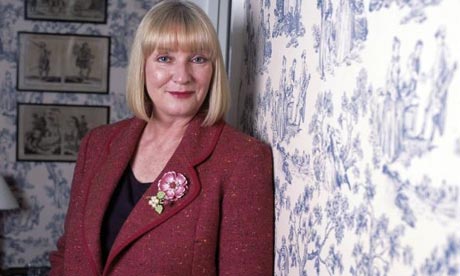
Television presenter Ruth Watson gets through plenty of concealing make-up when she's filming up and down the country - but it's not for her lovely blemish-free face, it is to cover up the red scaly patches on her hands.
Ruth is one of the 1.2million people in Britain who suffer from psoriasis, a chronic skin ailment for which there is no cure.
The glamorous, if slightly formidable former presenter of Hotel Inspector, who now fronts Channel 4's Country House Rescue, where she sets out to save historic homes by giving the owners tough advice, is pragmatic about her condition.
'I use the concealer particularly for the driving shots, when you see my hands up close,' she says.
'It's not that I'm embarrassed - it's a part of me - but I don't want it to distract people from the programme. I'd like them to be enjoying the story, rather than staring at the screen and wondering what's wrong with my hands.'

Well covered: Ruth Watson's fringe hides the inflamed skin on her hairline due to psoriasis, which started when she was 24
The renowned businesswoman, hotelier, restaurateur and writer started to develop symptoms at the age of 24, not long after she had got together with her husband David.
'It was a huge time of change in my life and I jokingly say to David that it's all his fault, as stress can be a factor. I first noticed it on my scalp and dismissed it as dandruff.
'But I soon realised it was more serious and quite quickly it spread over the rest of my body, arms, legs, torso - everywhere basically, apart from my face, thank goodness.
'Ironically, I've always had decent skin and although my hairline can be badly affected, it hasn't reached my face.'
Psoriasis - the effects of which were memorably highlighted by actor Michael Gambon in the TV series The Singing Detective when his character developed the illness - most commonly appears between the ages of 15 and 25, according to Gladys Edwards, chief executive of the Psoriasis Association.
The charity has been dispensing help and advice as well as raising money for research for more than 40 years.

Irritation: A total of 1.2million people in Britain suffer from psoriasis which causes itching (file photo)
'It is regarded as an autoimmune condition that causes too many skin cells to be produced,' says Mrs Edwards.
'In a psoriasis sufferer, the cells renew every two to six days instead of the usual 21-28 days. This produces patches or plaques of silvery white skin which is usually red and inflamed, and causes itching and pain to various degrees.'
Although Ruth admits she is sometimes in pain, her no-nonsense approach to life stands her in good stead. She is able to take a step back and see psoriasis as just one small part of her busy life.
As well as filming for up to 100 days of the year, her main job is running The Crown And Castle in Orford, Suffolk, a 19-room hotel and restaurant, with David.
The couple live at a 16th Century farmhouse nearby with their beloved wire fox terriers Annie and Teddy - and time there is precious.
After coping with her condition for many years, Ruth has advice for fellow sufferers.
'Don't see living with psoriasis as a battle,' she says. 'Accept that it's part of your life but don't let it define you. Learn to live with it, like you would a slightly difficult pet dog.'
Always immaculate on screen - usually in long jackets and structured skirts in bold colours - Ruth is adamant that psoriasis has not affected her dress sense, and her self-esteem is definitely intact.
'I've never been one to expose my body, and at my age, short skirts aren't an option anyway, and flabby upper arms mean I'm not one for short sleeves or sleeveless dresses.
'The one area I've had to be careful with is my hair. Because I get psoriasis very badly on the hairline, I do have a permanent fringe. And whenever-I have my hair done, I tell the boys and girls washing my hair straight away, because I don't want them to be frightened or wrongly think they might catch something.'
Treatment for psoriasis is divided into three basic categories, depending on the severity: creams and ointments rubbed into the skin; phototherapy, the use of natural and artificial light; and oral and injected medicines.
'I'm not keen on altering the chemical balance inside my body,' says Ruth, 'and for me I've discovered it works best if I use treatments on my scalp, one of which is a mild steroid. And I couldn't live without my baths, to which I add E45 bath oils.
'I once tried light therapy, standing naked in a Tardis-like contraption. Although the psoriasis did go away for two weeks, it came back with a vengeance.'
Gladys Edwards agrees that finding out what's right for you can be a painstaking process, but keeping the skin moisturised is essential. A healthy diet with plenty of water, fruit and vegetables is also recommended, and psoriasis sufferers need to take care with alcohol, as it dries the skin, which adds to the irritation.
Ruth has had only one psoriasis-free break since she was a young woman, during a holiday in Italy many years ago.
'We lay sunbathing on rocks for five days and my psoriasis did go. But although I like being warm, I hate sunbathing and direct sunlight. And it always comes back.
'Tolerate it rather than fight it is my motto.'
The second series of Channel 4's Country House Rescue is on Thursdays at 8pm. www.psoriasis-association.org.uk.
source
|
Bookmark this post:
|
|

0 comments
Post a Comment